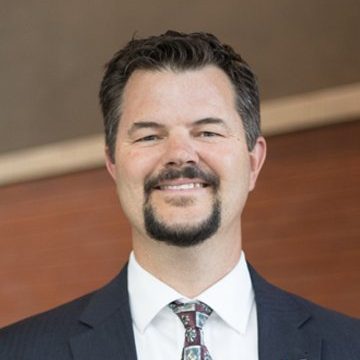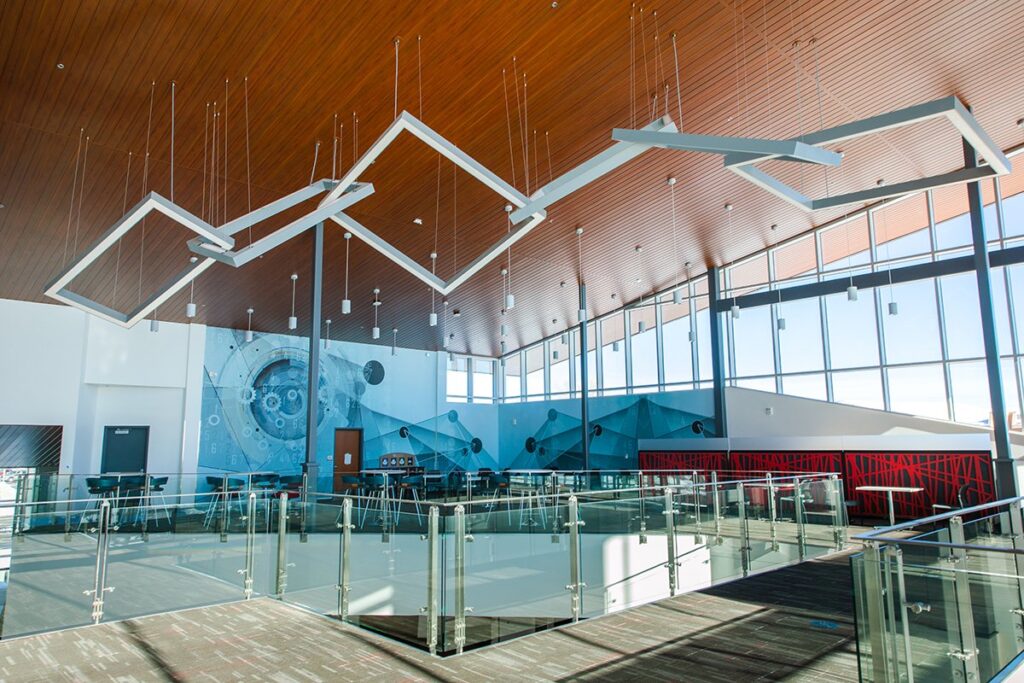LaPlante speaks to his background, working as Western’s advancement ace, and the status of the university’s Elevate Western campaign
By Kira Cordova

“The genuine curiosity, passion and care our faculty and staff show our students is contagious. When a prospective donor witnesses this, the magic happens,” relays Mike LaPlante, Western’s vice president of advancement, on the reasons that donors make sustaining contributions to Western.
LaPlante — who has been in his current role for more than three years — is in charge of Western’s fundraising efforts.
He says his favorite part of the job is “matching a donor’s passion and interest with a priority project at the university, and seeing just how appreciative a donor is when [that match] happens.”
“Introducing a student scholarship recipient to the scholarship donor is also something I look forward to doing,” he adds.
LaPlante’s background
LaPlante comes to his current role after a long history with fundraising and university advancement gigs. He’s held jobs in higher education since 1993 — primarily in leadership development roles.
Originally, LaPlante began his career in intercollegiate athletics, where he focused on fundraising for NCAA programs — first at San Diego State University — and later at Cal Poly.
“A job at Colorado State University (CSU) brought me to beautiful Colorado [where] I made the jump from intercollegiate athletics development work to university advancement, broadening my scope to assist all areas of campus with their fundraising efforts,” says LaPlante.
LaPlante’s final role at CSU saw him managing the billion dollar State Your Purpose campaign, an eight-year effort that coincided with CSU’s 150th birthday and met its fundraising goal nearly two years ahead of schedule, ultimately generating $1.28 billion.
In his current role with Western, LaPlante continues to live up in Fort Collins and typically spends 6 to 7 days a month on campus. “Easily, the least favorite part of the job is navigating Fairplay and Monarch Pass in the dark when the roads are slick,” he adds.
LaPlante’s experience on the CSU campaign — and with a type of fundraising known as comprehensive campaigns at Cal Poly — have uniquely prepared him for his role at Western, which he accepted in the spring of 2019 after an introductory conversation with former Western president Dr. Greg Salsbury.
A comprehensive campaign
Comprehensive campaigns, in LaPlante’s words, have “multiple pillars,” a phrase that indicates several institutional goals.
Since taking the Western VP job, LaPlante has played a pivotal role in launching the university’s latest fundraising effort, the Elevate Western campaign — a multi-pronged effort.
The current campaign kicked off in 2019 and is scheduled to end on June 30, 2026, the cessation of the university’ fiscal year.
Elevate Western, which is still in its so-called quiet phase, has raised $37 million thus far from 12,000 gifts contributed by around 6,000 donors.
During the quiet phase of a campaign, the university will work with prospective key donors before announcing and opening the public phase, when a campaign will push to get as many people to contribute as possible. The namesake quiet aspect is the exact goal of the campaign, which is typically set later based on the amount raised in this initial phase.
Based on the current results, LaPlante says that Western has established a goal range for the eight-year effort to generate between $60 and 80 million.
According to LaPlante, when working with large companies and foundations, Western’s foundation tries to remain at the local or state level.
“We primarily seek grants from Colorado-based private foundations,” he said. That includes the Temple Buell Foundation, the Daniels Fund, and the Gates Family Foundation, although the foundation has also submitted proposals to national organizations when an opportunity arises that closely matches an area of need at Western.
“We have also approached [private] companies, again, primarily in Colorado. A few examples would be Gunnison Valley Health, Vail Summit Orthopedics, and Alpine Bank,” adds LaPlante.
Thus far, the average campaign contribution has been just under $2,000, with the median gift of just $100 signaling the importance of donations stemming from individual alumni and community members. LaPlante adds that many individual donors have given multiple times in the campaign’s first four calendar years.
Defining the campaign’s purpose
“In developing the funding priorities for the Elevate Western Campaign, we worked with deans, department chairs, athletic directors and university leadership,” says LaPlante of the campaign’s goals, which have been honed by a designated campaign team.
That team includes LaPlante, former interim president Nancy Chisholm (‘90), current university president Brad Baca, executive director of Western’s Foundation for nearly 25 years Tom Burggraf, as well as two members each from Westerns Board of Trustees and Foundation Board of Directors.
That group has hashed out four primary fundraising pillars: the Rady School, student scholarships, program and faculty support, and capital projects.
“The two main capital projects we are hopeful to accomplish within the campaign timeframe are the renovation of the Mountaineer Bowl Events Complex and the renovation of the Paul Wright Gym,” notes LaPlante.
The renovation of the Mountaineer Bowl is already underway and should be complete by Fall 2023, largely thanks to a $15 million donation from Paul and Katy Rady.
LaPlante adds that new capital needs may crop up over the course of the campaign and could be added to the list of priorities.

The foundation’s role
Western’s foundation, like other university foundations, is a distinct charitable organization that generates and manages private support for its associated school. This includes guiding donors to potential projects to meet the university’s goals, as well as financially stewarding their contributions.
Burggraff and the foundation team also maintain relationships with donors “to ensure that they understand the tremendous impact they are making with their investment,” says LaPlante.
The Foundation was incorporated in 1975 under the leadership of Gunnison attorney Dick Bratton (‘54). Its formation was made possible thanks to a bequest from Jessie and Dan Thornton (a former governor of Colorado) and has been located in the Aspinall-Wilson center since 1984.
The impact of giving
“We have [created] 66 scholarships since the inception of the [campaign] and this has been instrumental in enabling Western students to attend WCU — perhaps lightening their burden enough to focus primarily on their academics — or maybe only having to work one job,” says LaPlante on the importance of private support, which he adds “plays a critical role in the future of Western.”
LaPlante cites the Clark Family School of Environment & Sustainability (funded by several multimillion dollar donations from benefactor Butch Clark), the Borick Building (largely the result of a $3 million gift from Steve Borick in the early 2000s), Mountain Sports, the Rady School of Computer Science and Engineering (made possible by an $80 million gift from Paul M. Rady), and the retention-focused EPIC Mentors as “perfect examples of the impact private support has had at Western.”

The school’s unique Mountain Sports program was originally funded by a seed donation from Michael Johnson (class of ‘77) in 2010 and has been bolstered by ongoing gifts from Johnson, as well as from Steve Borick (class of ‘75) and Gunnison’s Tourism and Prosperity Project (TAPP), which invests money garnered from tourism revenue back into tourism, outdoor recreation, and sustainability-focused community projects.
The EPIC Mentors program is the brainchild of the Geiman Senior Fellows (originally the Geiman Fellows), a group of students involved in a program to broaden their perspectives of the changing global economy through coursework, service learning, and travel funded by university donor Dave Geiman.
Five years ago, the fellows decided to tackle Western’s low retention rate head-on and created the framework for the EPIC Mentors program, which trains students already at Western to mentor their incoming peers as they adjust to campus life, begin their academic careers, and start pondering the possibilities of the next four years.
“EPIC Mentors are here to help you explore your academics, career, and life goals as well. EPICs have a broad knowledge of Western’s programs and will help you to discover your interests, values and strengths to find a major that fits your career and life goals,” reads Western’s page on the EPIC Mentorship program.
LaPlante emphasizes that none of these programs would exist without a donor who “initiated, invested and cared deeply about advancing Western.”
“In university fundraising we often refer to donor support as the margin of excellence, and at Western, this is absolutely the case,” concludes LaPlante.
